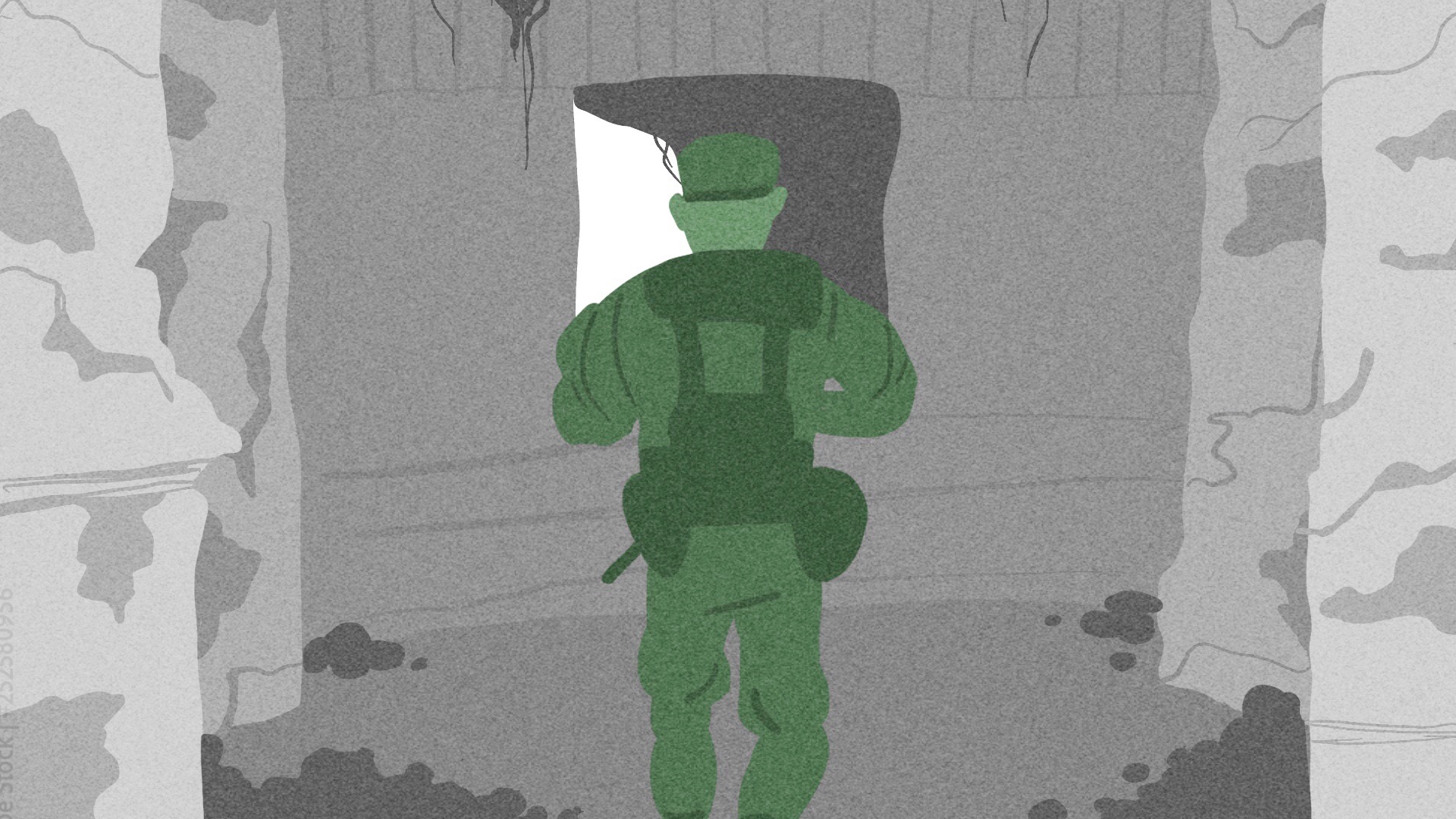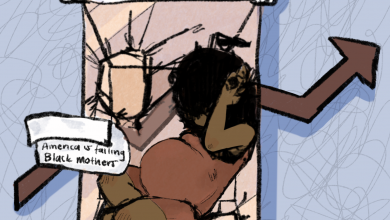The Russia-Ukraine War Has Exacerbated The United States’ Hypocrisy Problem

Design by Alex Lynaugh
Image Description: A green military figure facing a window, surrounded by cracked gray walls and rubble.
The Russia-Ukraine war has forced us into a full embrace with imperialist Euro-American political narratives. Late last month, President Joe Biden condemned the actions of Russian President Vladimir Putin during his trip to Europe and assured that “the darkness that drives autocracy is ultimately no match for the flame of liberty that lights the souls of free people everywhere.” The United States, ironically, has become a newfound champion for international freedom. Hypocrisy, thus becomes the forefront of these narratives, as imperialist countries can absolve themselves of their wrongdoings and paint themselves as international saviors.
NATO members, The United States, Britain, and Poland, have all been vocal in condemning Russia and President Putin, even though the 2022 invasion of Ukraine largely parallels the 2003 invasion of Iraq, which all three actors were responsible for. Both are illegal wars, led by imperialist states, that infringed upon the sovereignty of other states and yet, the American and NATO savior narrative seems to dismiss this parallel.
Blind allyship for any nation is dangerous, especially as the anti-Russian and pro-Ukrainian sentiment that has become overwhelmingly present in the media prompts no other option. As important as it is for states to defend their people from political aggression, it is also necessary to recognize that states, even those under attack, are still political organizations that should not be placed on a pedestal and absolved of their history. Or in the case of Ukraine, their present as well.
In the third week following Russia’s invasion, NATO celebrated International Women’s Day by tweeting a series of pictures depicting Ukrainian military in action, with one picture showing a servicemember donning a Nazi “Black Sun” on her chest. This tweet was later deleted, but not after being shared hundreds of times.
The goal of the Russian invasion, according to President Putin, is to “denazify and demilitarize” Ukraine. Despite contrasting analyses on how much truth his claim actually holds, Ukraine does, in fact, have a neo-Nazi and alt-right presence that has forced its way into the country’s government and military. In 2012, Svoboda, an ultranationalist party in Ukraine, received 10% of the vote with Svoboda leaders running on anti-Semitic platforms and electing Holocaust-sympathizing leaders to Ukraine’s parliament. In 2014, the neo-Nazi Azov Battalion was officially incorporated into Ukraine’s National Guard and has become a current controversial part of Ukraine’s fighting forces against Russia.
People, especially neoliberals who are gunning for NATO intervention, have made the conclusion that Ukraine’s Nazi problem is merely Russian propaganda. But, the extensive history and modern-day presence of neo-Nazi sentiments within the state reveals a more complex situation in which one cannot and should not pick sides. This is not to say that neo-Nazism is solely unique to Ukraine, because the United States and Russia themselves can show that it is not. Rather, there is an issue with the way in which we are forced to give our allyship to a state or any part of the military industrial complex in order to express solidarity. This is especially hard to avoid when American militarism permeates every aspect of the conversation surrounding Russia and Ukraine, and implies that allyship is necessary for people’s protection.
Refugees deserve a safe haven, and the international response to the Ukrainian refugee crisis has granted them that. The United States, specifically, has extended an immense amount of political and economic accommodation — showing that compassion is not only possible, but expected during a time of political turmoil. One month after Russia’s invasion, President Biden committed to welcoming up to 100,000 Ukrainian refugees into the country in addition to allocating $1 billion for humanitarian assistance. According to polls conducted by the Pew Research Center, 69% of Americans support accepting Ukrainian refugees into the country, while a 2015 poll found that 53% of Americans did not support accepting Syrian refugees into the country.
The hypocrisy of the American people and of the United States government does not go unnoticed, especially by the Black and Brown migrants and refugees who experienced America’s cold response first-hand. Late last March, asylum seekers protested alongside the San Diego-Tijuana border against Title 42, an emergency order that restricts the entrance of any asylum seeker due to COVID-19 precautions. This anti-asylum policy has not been implemented equally towards Ukrainian refugees as it has to Haitians and Central Americans in the past two years, prompting frustration among these latter communities. Signs featuring messages like “Everyone has the right to life” echo sentiments of those in the Middle East who feel that this double standard reduces them as “subhuman.”
This sudden desire to unequivocally help refugees is great, but given past relations between the United States and refugees, it is impossible to avoid the prevailing question — who does the United States consider worthy of saving and why?
The disparities in treatment can largely be traced back to xenophobia, racism, and Islamophobia. Still, many politicians and journalists argue that the difference in response is simply an “unprecedented response to unprecedented times.”
The reality is that imperialist wars are not new: the ongoing unlawful occupation of Palestinian land and the 2003 United States insurgency in Iraq demonstrates this disconnect. Of the ten largest refugee crises since 1960, the 2022 Ukraine-Russia conflict and the 1991 Yugoslavia wars were sixth on the list, and were the only two that were European-based. This is not unprecedented — it is just uncomfortable. Uncomfortable for politicians, the media, and for imperialist powers, because it is now happening to white people. With war and destruction being seen as an inevitable component of life in non-Euro-American countries, seeing European faces suffer at the hands of war must call for some extreme, ‘never-before-needed’ response. Which is, again, rooted in xenophobia and racism.
In June of 2021, Vice President Kamala Harris’ message to Guatemalan migrants hoping to seek asylum or humanitarian protection at the US border consisted of three words — “Do not come.” In September of the same year, this same sentiment was extended to Haitians when Border Patrol agents on horseback were using horse reins to push migrants back into the Rio Grande river, and similarly when Syrian refugee numbers reached their peak, yet only 42 Syrians had been allowed into the United States. This sentiment has been extended to a majority of immigrants and refugees in the past, but not to Ukrainian refugees.
This is not to say that the open-arms approach for Ukrainian refugees is undeserving; rather, the context of this approach clearly illustrates systemic racism in the immigration process and depicts a deadly double standard in which white refugees must be protected, but Brown and Black refugees are collateral damage that can be ignored.
Under the neoliberal analysis of the Russia-Ukraine conflict, it is expected to be pro-America and pro-NATO in order to be anti-war and anti-human suffering, even though these two concepts are actually mutually exclusive. Instead, it is possible to reject global imperialism and militarism in all forms, while still being able to care about the people being affected. By blindly aligning ourselves with the United States and their allies, we become confined to viewing geopolitical issues solely through their narratives — ones that are full of hypocrisy and self-righteousness on behalf of both military intervention and refugee treatment. We can defend human life and we can oppose war, but we can only fully do this through an approach that is void of Euro-American propaganda.




